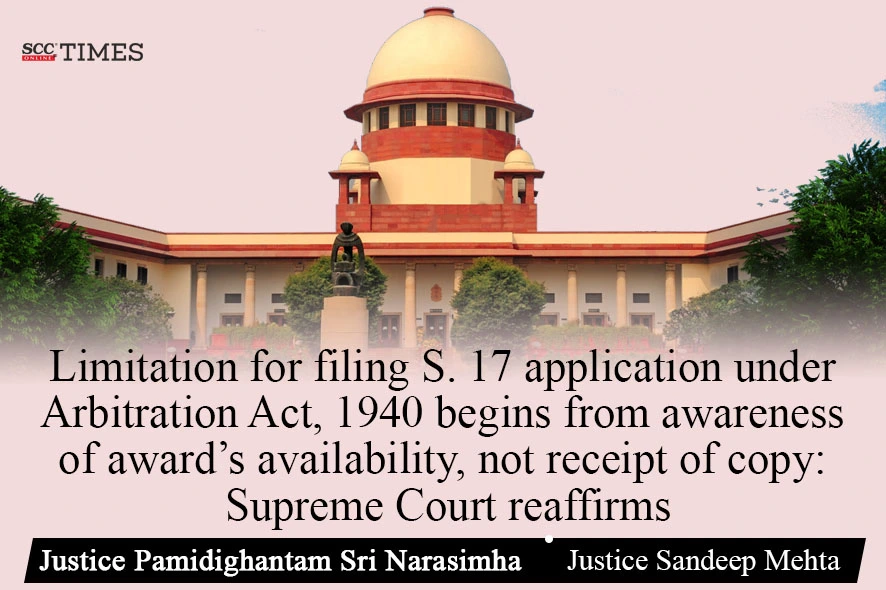Supreme Court: In an appeal filed against the order passed by the Delhi High Court, wherein the Court affirmed the District Court’s decision to declare the appellant’s application for making of the award as premature because it was filed before the commencement of the limitation period for filing objection against the award, the division bench of Pamidighantam Sri Narasimha* and Sandeep Mehta, JJ. set aside the impugned order and directed the District Judge to take up and dispose of the matter as expeditiously as possible, preferably within a period of five months from the date of receipt of this judgment. The Court reaffirmed that the date of receiving the copy of the award is not the relevant trigger for limitation, but rather the point at which the party becomes aware of its availability.
Background
The appellant’s husband, the sole proprietor of S.R. Engineering Construction, secured a work order from the respondents in 1987-1988 for constructing an armament section at Tezpur. After completing the work and raising a bill in 1993, the respondents failed to make payment, prompting the appellant to seek arbitration. Although an arbitrator was appointed in 2019, the arbitration process faced delays, and the award was finally made in the appellant’s favor on 31-05-2022. However, the award could not be published due to the respondents’ failure to pay the arbitrator’s fees, which were cleared only in November 2022. In the meantime, on 10-11-2022, the appellant filed an application under Section 17 of the Arbitration Act, seeking the pronouncement of judgment according to the arbitral award. The District Court dismissed the application as premature, stating that the 30-day limitation period for filing objections had not expired, as the formal notice of the award was received by the respondents on 18-11-2022. The appellant’s revision petition before the High Court was also dismissed. The central issue for consideration was whether the limitation for filing a Section 17 application begins from the date the respondent receives formal notice of the award, or from the date the respondent has actual knowledge of the award, which in this case occurred earlier.
Analysis and Decision
The Court viewed that the respondents had notice of filing of the award due to the order dated 21-09-2022, wherein the District Court had directed the respondents to hand over the balance fee to the arbitrators, following which the award shall be furnished. The respondents were completely aware of this direction, which sufficiently states that clearing the fees will result in the court notifying the filing of award. The limitation for filing objections to the award is 30 days and is governed by Article 119(b) of the First Schedule to the Limitation Act, 1963. The trigger for the limitation to start running specified therein is the date of service of notice of the filing of the award. Section 14(2) of the 1940 Act requires that the court of relevant jurisdiction should give notice to the concerned parties when an award is filed.
The Court, in examining Article 119(b) of the Limitation Act, 1963, and Sections 14 and 17 of the Arbitration Act, 1940, emphasized that the limitation period for challenging an arbitral award starts only when the parties are notified of its filing. While Article 119(b) of the Limitation Act explicitly requires the ‘service of notice’ for the limitation to begin, Section 14(2) of the Arbitration Act only mandates that the court ‘give notice’ to the parties, without specifying the precise form of notice. The Court interpreted the term “notice” reasonably, suggesting that it refers to the point at which parties become aware of the award’s existence, enabling them to file objections. This interpretation implies that the essence of ‘notice’ is to ensure the parties are informed about the award and can take appropriate action, rather than enforcing an additional procedural step before the limitation period begins.
The Court, drawing upon its earlier decision in Nilkantha Sidramappa Ningashetti v. Kashinath Somanna Ningashetti, 1961 SCC OnLine SC 75 wherein it was held that the term “notice” in Section 14(2) should not be restricted to formal notice, emphasizing that informal communication suffices. The Court also noted that if limitation were to start only after the issuance of a formal notice, it would allow a party who is already aware of the award to delay filing objections, thereby defeating the purpose of ensuring timely resolution in arbitration. Similarly, in Ch. Ramalinga Reddy v. Superintending Engineer, (1999) 9 SCC 610, the Court accepted that the mere receipt of information by the award-debtor’s pleader could satisfy the requirement under Section 14(2). The Court observed that, as per the text of Section 14, a written notice is not necessary for compliance with the provision, as the key is that the parties are made aware of the award.
The Court said that the core function of Section 14(2) of the Arbitration Act, 1940, is to ensure that the parties are made aware of the existence of the arbitral award. The Court clarified that the requirement for notice is not about the specific form it takes, but about the party’s awareness of the award. The Court emphasized that the pleader’s awareness is sufficient for the party to access and scrutinize the award, and any subsequent formal notice does not alter the legal rights that have already accrued.
Applying this principle to the present case, the Court found that the order dated 21-09-2022, which made the award available to the parties, was sufficient notice, despite the formal notice of filing being issued on 18-11-2022. The Court reasoned that the respondents were already aware of the award’s existence from 21-09-2022, and the later formal notice did not change this fact. The Court also referenced the decision in Indian Rayon Corpn. Ltd. v. Raunaq and Co. (P) Ltd., (1988) 4 SCC 31 , which reinforced that the purpose of Section 14(2) is to ensure the parties are aware of the award, and that compliance with this requirement is substantive. The Court further noted that treating this as a procedural formality would allow parties to exploit technicalities to delay the filing of objections, which would undermine the expeditious nature of arbitration.
The Court addressed the respondents’ argument that the limitation period should start from the date they received a copy of the award, calling this an impermissible departure from the plain text of Section 14(2). In Bharat Coking Coal Ltd. v. C.K. Ahuja 1995 Supp (1) SCC 744, the Supreme Court had clarified that the essence of Section 14(2) is not the date of receiving a copy of the award, but rather the awareness of its filing. In that case, despite the formal notice being issued later, the Court held that the limitation period for filing objections begins when the party becomes aware that the award has been filed and is accessible.
The Court in the present case emphasized that the parties must take steps to scrutinize the award as soon as they become aware of its existence and accessibility. This interpretation aligns with the intent of the 1940 Act, which is designed to expedite dispute resolution. The Court further observed that allowing a party, already aware of the award, to delay proceedings by insisting on procedural formalities would frustrate the expeditious resolution of disputes, undermining the very purpose of the Arbitration Act. Therefore, the date of receiving the copy of the award is not the relevant trigger for limitation, but rather the point at which the party becomes aware of its availability.
Applying the aforementioned principles to the facts of this case, the Court concluded that both the District Court and the High Court had erred in holding that the limitation period for filing objections was still running when the appellant filed an application under Section 17 of the Arbitration Act on 10-11-2022. The formal notice of the filing of the award on 18-11-2022 was deemed irrelevant, as the respondents had already been sufficiently informed of the filing of the award on 21-09-2022. The Court considered the order directing the respondents to clear the fees as a clear intimation of the award’s filing and held that the respondents were made aware of the award long before the formal notice was issued.
The Court thus concluded that the limitation period for filing objections had expired on 20-10-2022. Consequently, the appellant’s application seeking the pronouncement of judgment in terms of the arbitral award was deemed valid, as it was filed well beyond the period allowed for objections.
CASE DETAILS
|
Citation: Appellants : Respondents : |
Advocates who appeared in this case For Petitioner(s): For Respondent(s): |
CORAM :




